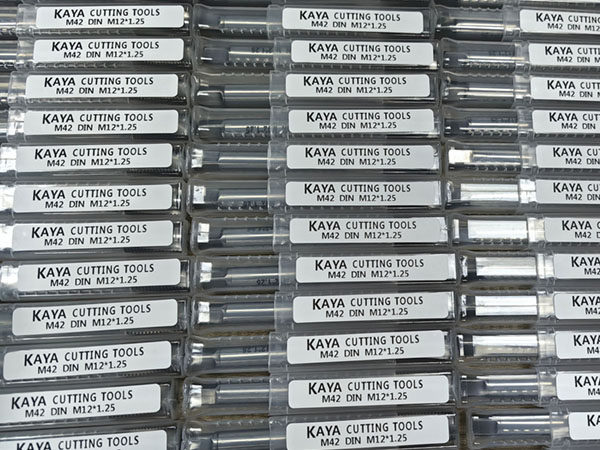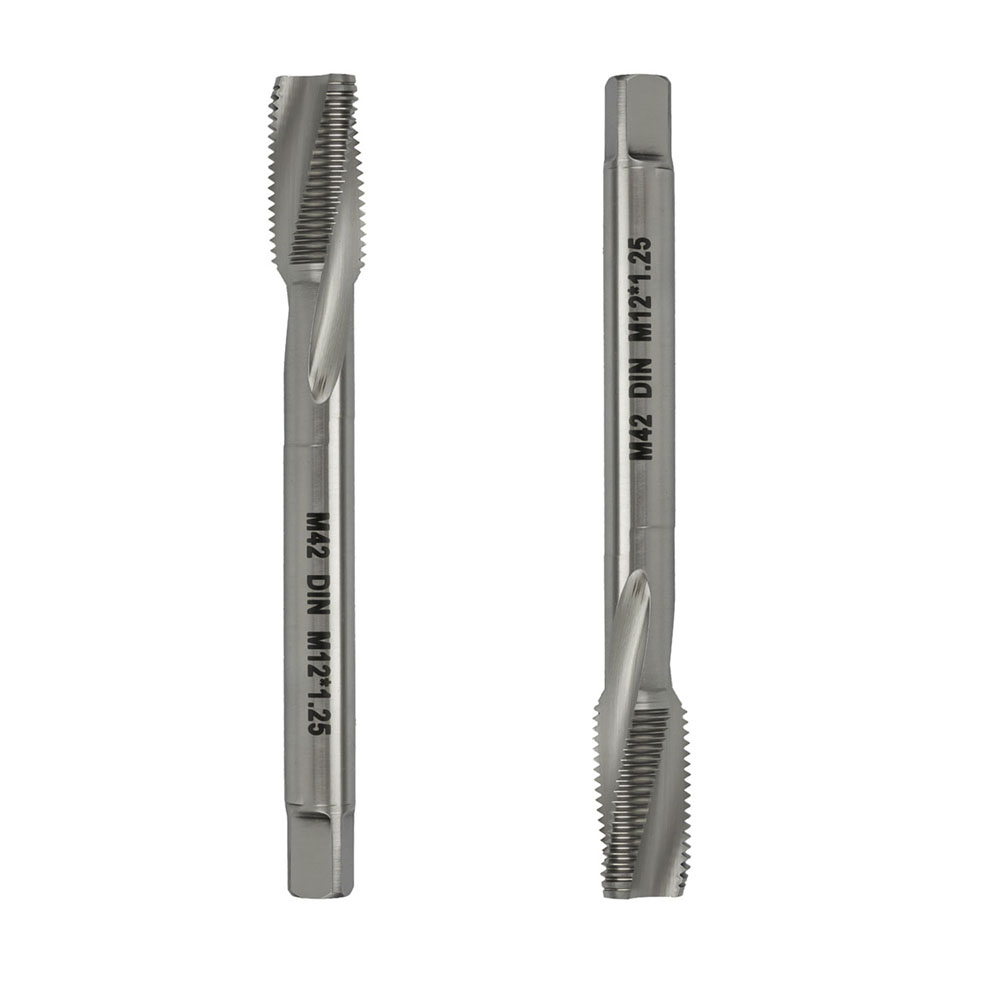
Advanced Applications and Technical Analysis of HSS-E M42 Taps in Automotive Manufacturing
In the field of precision manufacturing in the automotive industry, taps play a crucial role in thread machining, directly impacting production efficiency and component reliability. Particularly, cobalt-based high-speed steel (HSS-E M42) taps are widely used in automotive manufacturing. This article explores their technical advantages and process adaptation points based on the industry's unique working conditions.
Six Core Advantages of HSS-E M42 Taps in Automotive Manufacturing
1. Superior Performance in High-Strength Materials
Industry Challenges:
- The trend of lightweight vehicles has increased the use of high-strength steels (e.g., DP980) and compacted graphite iron (e.g., GJV450).
- New energy vehicle motor housings extensively use die-cast aluminum-silicon alloys (Si content: 12%-18%).
M42 Technological Breakthroughs:
- The 8% cobalt content enhances substrate red hardness, maintaining an effective hardness of 62-64HRC when machining materials above HRC35.
- Special vanadium carbide (VC) dispersion reinforcement improves resistance to abrasive wear from silicon particles in aluminum alloys (reducing wear rate by 40%).
Performance Validation:
- When machining Volkswagen MEB platform motor housings (AlSi12Cu), M42 taps achieve a tool life of 3,500 holes (compared to only 1,800 holes for conventional HSS taps).

2. Stable Performance in Automated Production
Industry Demands:
- Automotive production cycle time ≤ 45 seconds per part, with tool life deviation < 15%.
- Robotic tool changers require high dimensional consistency (diameter tolerance ±0.005mm).
M42 Process Control:
- Double vacuum melting ensures material uniformity (hardness fluctuation ≤ 1.5HRC).
- Fully ground thread profile ensures precision (thread angle error < ±15').
Measured Data:
- In Toyota's TNGA production line, after 200 hours of continuous machining, the thread pitch diameter variation was only 0.008mm.

3. Enhanced Resistance to Complex Cutting Conditions
Typical Challenges:
- Intersecting oil passages in engine blocks lead to interrupted cuts (≥3 interruptions per hole).
- Turbocharger high-temperature alloys (e.g., Inconel 718) generate cutting heat exceeding 800°C.
M42 Structural Innovations:
- Progressive cutting taper design (3.5 threads engagement) reduces instantaneous impact force by 30%.
- Internal cooling channels combined with nano-coating improve heat dissipation (cutting temperature reduced by 150°C).
Comparative Results:
- When machining Mercedes-Benz M254 engine blocks, M42 tap breakage rate was 0.2‰, compared to 1.5‰ for conventional taps.

4. High Thread Quality for Precision Manufacturing
Industry Standards:
- ISO 529 thread accuracy requirements (automotive industry standard: 6H).
- New energy battery housings require threads that meet IP67 sealing standards.
M42 Precision Control:
- Five-axis CNC relief grinding ensures a smooth thread back (Ra ≤ 0.4μm).
- Elastic deformation compensation algorithm optimizes pitch diameter adjustments (compensation: 0.003-0.005mm).
Quality Improvement:
- Tesla 4680 battery housing thread sealing pass rate improved from 92% to 99.6%.
5. Adaptability to Special Processes
Emerging Needs:
- Machining of composite materials (e.g., CFRP-metal stacked components).
- Compliance with minimum quantity lubrication (MQL) for environmentally friendly operations.
M42 Custom Solutions:
- 0.1mm negative chamfering to prevent CFRP delamination.
- Diamond coating (friction coefficient 0.08) optimized for low-lubrication MQL environments.
Breakthrough Achievement:
Zero delamination damage in BMW i-series carbon fiber driveshaft machining.
6. Cost Efficiency in Lean Production
Economic Analysis (Based on 500,000 transmission housings per year):
| Metric | Conventional HSS | M42 Solution | Cost Reduction |
|---|---|---|---|
| Cost per hole | ¥0.38 | ¥0.24 | 36.8% |
| Tool change time | 12 min/shift | 6 min/shift | 50% |
| Scrap rate | 1.2% | 0.3% | 75% |
Technical Support:
- Optimized chip evacuation groove design (60% higher chip removal efficiency), reducing machine downtime.
- Adaptive wear compensation technology extends tool life by 20%.
Material Properties and Automotive Adaptability
M42 steel (ASTM M42) contains 8% cobalt, refined through a double vacuum melting process, achieving:
- Red hardness: Maintains 62HRC at 620°C, while conventional HSS drops to 58HRC at 550°C.
- Grain boundary purification: Oxygen content ≤ 30ppm, significantly improving edge chipping resistance.
- Enhanced carbide distribution: MC-type carbides increased to 18%, improving wear resistance.
Automotive Industry Verification:
A German automaker’s transmission housing production line reported:
- M42 tap life: 1,200 holes in QT700 ductile iron (vs. 800 holes for standard taps).
- Cutting edge temperature was 40-60°C lower than conventional HSS during continuous operation.
Special Thread Machining Solutions
1. Deep Blind Hole Tapping in New Energy Motor Housings
For aluminum housings with L/D ratios exceeding 800mm:
- Spiral flute tap with 5° rake angle design.
- Custom TiCN-TiAlN composite coating (3-5μm thick).
- Cutting speed: 35m/min (vs. 25m/min for conventional HSS).
2. Turbocharger High-Temperature Alloy Machining
For Inconel 718:
- Modified thread profile with fully ground tap geometry.
- Forced internal cooling structure (coolant pressure 8MPa).
- Tool life: 45 parts per regrind (vs. 28 parts for conventional taps).
3. Integrated Die-Cast Car Body Machining
For Tesla Model Y rear underbody (AlSi10MnMg):
- L/D = 10 ultra-long tap design.
- Segmented variable lead design (lead difference: 0.03mm per thread).
- Achieved M12×1.75 threading in 600mm deep holes.
Process Parameter Optimization Model
Based on automotive plant test data [Vc= (K×Co)/(T^m×D^n)]:

where:
- K: Material coefficient (0.25 for cast iron, 0.18 for alloy steel).
- Co: Cobalt content adjustment factor (1.35 for M42).
- T: Target tool life (holes).
- D: Thread diameter (mm).
Recommended Feeds:
- Cast iron: 0.15-0.2mm/rev
- Tempered steel: 0.1-0.15mm/rev
- Aluminum alloys: 0.25-0.3mm/rev
Failure Analysis and Prevention Strategies
| Failure Mode | Occurrence Rate | Solution |
|---|---|---|
| Adhesive Wear | 42% | Use MoS₂-based cutting fluid |
| Micro Chipping | 28% | Optimize flute helix angle (35° → 42°) |
| Thermal Cracking | 19% | Increase back relief radius (R0.3 → R0.5) |
Automotive Industry Certification Compliance
To meet the requirements of IATF 16949, the following measures are implemented:
- Establishment of a Tool Traceability System (QR code identification).
- Provision of CPK Process Capability Reports (Key dimension Cpk ≥ 1.67).
- Compliance with Volkswagen VDA 6.3 Tool Certification Standards.
Typical Application Case:
After adopting customized M42 taps, a Japanese automotive manufacturer’s engine production line achieved:
- Extended tool change intervals from 4 hours to 10 hours.
- Thread accuracy maintained at ISO 2 level for over 3,000 holes.
- Reduced per-unit machining cost by 23%.
Conclusion
By transforming material advantages into application-specific solutions, HSS-E M42 taps redefine automotive threading in efficiency (+15%-20%), quality (scrap reduction by 50%-80%), and cost (-25%-40%), making them an indispensable tool in modern automotive manufacturing.
OEM Capability
 We like to do design according to all the customers' requirements, or offer them our new designs. With strong OEM/ODM capabilities, we can fill your sourcing demands.
We like to do design according to all the customers' requirements, or offer them our new designs. With strong OEM/ODM capabilities, we can fill your sourcing demands. Categories
| HSS-PM Taps | HSSE-M42 Taps |
| HSSE / HSS Taps | Spiral Flute Taps |
| Straight Flute Taps | Spiral Point Taps |
| Multi-function Taps |
| Solid Carbide Drill Bits | Twist Drill Bits |
| Center Drill Bits | Indexable U Drills |
| Flat-end Milling Cutter | Ball Nose End Mills |
